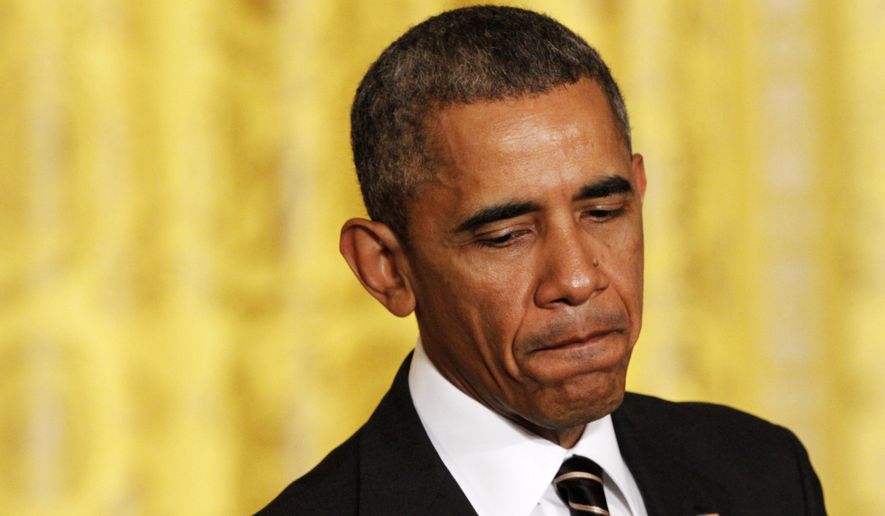President Obama said Tuesday that liberal critics, including Sen. Elizabeth Warren, are wrong about the negative impact of his massive proposed free trade deal with Pacific Rim nations, and he called on Congress to give him the power to negotiate the agreement swiftly.
“I love Elizabeth,” Mr. Obama said of the Massachusetts Democrat who is leading the fight against the Trans-Pacific Partnership. “We’re allies on a whole host of issues. But she’s wrong on this.”
Lawmakers are debating whether to grant Mr. Obama trade promotion authority, which would require Congress to vote up or down on the agreement without being able to amend it.
Republicans are generally in favor of the move, but the president faces a tougher sales job with members of his own party, with Democrats’ labor allies opposed to a free trade deal.
Mrs. Warren, for example, who has been pushing Democratic presidential candidate Hillary Rodham Clinton to embrace “middle-class” economic policies, has charged that the TPP will only help the “rich get richer.”
Mr. Obama, in an interview on MSNBC’s “Hardball,” told host Chris Matthews that his economic record proves he favors policies to help the middle class.
“Everything I do has been focused on how do we make sure the middle class is getting a fair deal,” Mr. Obama said. “I would not be doing this trade deal if I did not think it was good for the middle class. And when you hear folks make a lot of suggestions about how bad this trade deal is, when you dig into the facts, they are wrong.”
But even as he tried to win over Democratic lawmakers, Mr. Obama said some in his party are deliberately misleading their constituents on trade.
“Some of it has to do with politics,” Mr. Obama said. “Democrats aren’t averse to making political arguments that aren’t entirely accurate.”
He also said some lawmakers are opposed because, “particularly if they’re Democrats, they feel the pain” of people who have lost jobs that were blamed on past free trade deals.
AFL-CIO President Richard Trumka, waving the specter of labor union activists killed in other countries, told Congress on Tuesday to reject the fast-track trade authority legislation and the massive Asian trade deal that is likely to follow, saying that until other countries improve their human rights records, the U.S. shouldn’t agree to compete.
Mr. Trumka said the fast-track legislation and the TPP need to be stopped until the Obama administration stiffens its negotiating position.
Even as Mr. Obama seeks support, opposition is firming up. Senate Minority Leader Harry Reid said his stance on new free trade agreements “is not only ’no,’ but ’hell no.’”
Republicans say they will need Democrats to vote for the package, and put the onus squarely on the president.
“We’re really asking the White House to take the lead on rounding up Democratic votes,” a House Committee on Ways and Means Republican aide said Tuesday. “The president’s in a better position to get Democratic votes than [Ways and Means Chairman] Paul Ryan is.”
In the House, Democratic Rep. Henry Cuellar, a Texan, is co-sponsoring the fast-track legislation.
In the Senate, where Democrats have the power to filibuster, they also have a built-in trade champion: Sen. Ron Wyden, the ranking member on the Senate Committee on Finance, who helped write last week’s deal.
But he’ll have to face off against Mr. Reid, a Nevada Democrat who, as majority leader, last year blocked fast-track legislation from reaching the Senate floor, and who urged Mr. Wyden to slow down the bill this year.
Mr. Reid also said he’ll insist that Congress try to pass legislation forcing the U.S. to retaliate against what many lawmakers believe is currency manipulation by China — something Mr. Trumka said costs the U.S. millions of jobs.
“I have never, ever, in my 33 years in Congress, ever supported a trade agreement, and I’m not going to start now,” Mr. Reid said. “They’re not good for the American people. They’re not good for working men and women.”
Treasury Secretary Jack Lew, who has clashed with Capitol Hill over currency manipulation, sent a letter Tuesday to congressional leaders saying that if the U.S. insists on stricter language in the Pacific trade deal, it could be used against the Federal Reserve and American monetary policy as well.
Mr. Lew said the other countries involved in the negotiations have warned they’ll back out of a deal if the U.S. tries to get tougher.
“Our partners fear that a trade agreement with an enforceable currency discipline could constrain the ability of their monetary authorities to conduct appropriate macroeconomic policies, and that is a risk they are unwilling to take,” the secretary said.
Despite Mr. Reid’s pleas for a go-slow approach, both the House and Senate are speeding the fast-track legislation through. The Senate Finance Committee could vote on the legislation as early as Wednesday, with the House possibly following later this week — setting up floor votes next week just as Japanese Prime Minister Shinzo Abe, one of the key players in the TPP, is slated to visit Washington and address a joint session of Congress.
• Dave Boyer can be reached at dboyer@washingtontimes.com.
• Stephen Dinan can be reached at sdinan@washingtontimes.com.




Please read our comment policy before commenting.